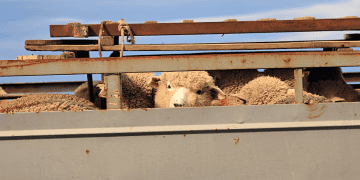Mongolia has begun sending live sheep to Uzbekistan, which is an important step in improving trade between the two countries.
This move comes after an agreement made during Mongolian President Ukhnaa Khurelsukh’s visit to Uzbekistan in June. During this visit, both nations promised to work together more closely in agricultural trade, particularly focusing on exporting wool, cashmere, leather, meat, and meat products from Mongolia to Uzbekistan and other countries in Central Asia.
As part of this arrangement, Mongolia plans to export 100,000 live animals to Uzbekistan. The Ministry of Food, Agriculture, and Light Industry has announced that the first shipments have started, with 1,440 live sheep already sent to Uzbekistan on two flights since December 21.
Raising livestock is a key part of Mongolia’s plan to reduce its reliance on mining. By the end of 2023, Mongolia had around 64.7 million livestock, with sheep making up 45.5% and goats 38.1% of the total.
Despite these efforts, the livestock sector is facing challenges due to disease outbreaks. Recently, cases of Peste des Petits Ruminants (PPR), known as sheep and goat plague, were reported in the western province of Khovd. Additionally, in October, the southeastern province of Dornogovi had to be quarantined because of an outbreak of Contagious Caprine Pleuropneumonia (CCPP), a serious disease affecting goats.
These health issues emphasize the need for strict veterinary measures to make sure livestock export efforts are successful. The ongoing partnership between Mongolia and Uzbekistan in agricultural trade is expected to strengthen their economic relationship and help diversify Mongolia’s economy.
Breaking supply chain news is just a click away at The Supply Chain Report. Enhance your knowledge of international trade at ADAMftd.com with free tools.
#MongoliaUzbekistanTrade #LivestockExport #AgriculturalPartnership #MongoliaSheepExport #UzbekistanAgriculture #CentralAsiaTrade #MongoliaEconomicDiversification #SheepExport #FoodSecurity #SustainableAgriculture















